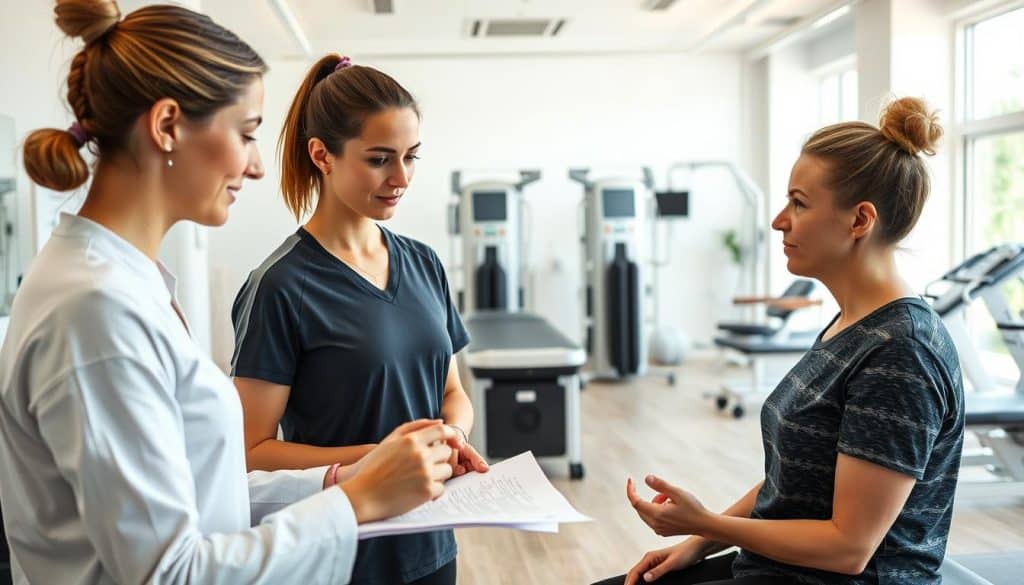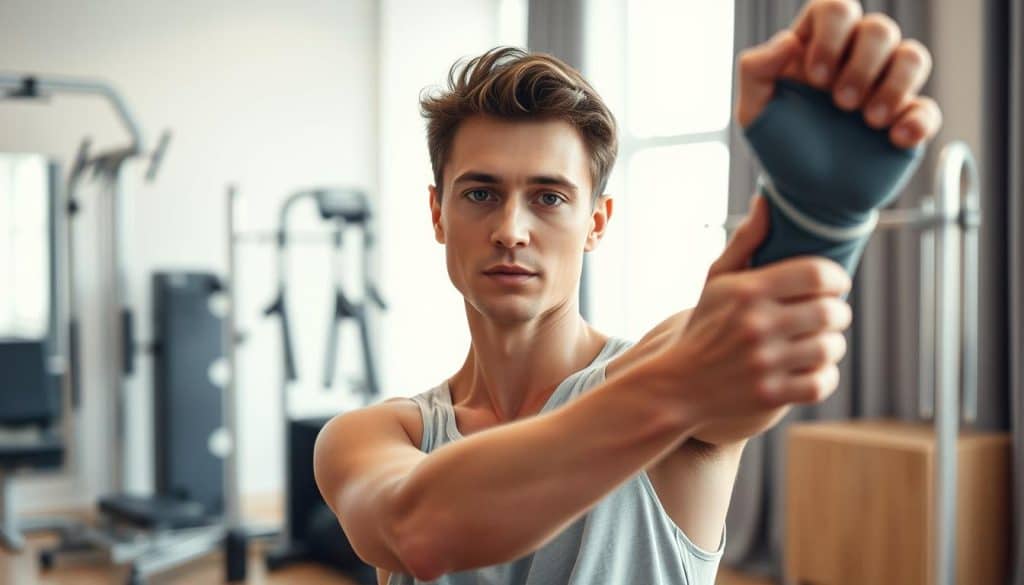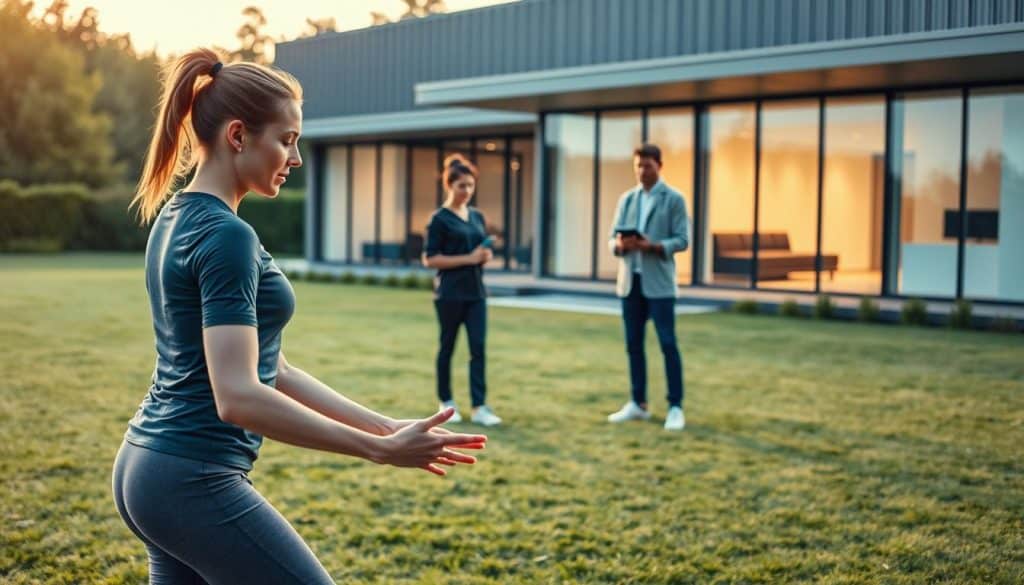Did you know 1 in 5 athletes struggle with persistent pain even after physical injuries heal? Research reveals outdated views of pain—focusing solely on tissue damage—often leave athletes trapped in endless recovery cycles. At Riverside Sports Therapy in Calgary, we break this pattern by treating pain as a multilayered experience shaped by your biology, mindset, and environment.
Traditional methods often miss critical connections between your body’s signals, emotional responses, and daily life pressures. For example, stress from missed games or social isolation can amplify discomfort, slowing your comeback. Our team identifies these hidden factors through advanced assessments, mapping how biological pain mechanisms interact with psychological and social influences.
You’ll receive tailored strategies targeting your unique needs, whether you’re managing nerve sensitivity, muscle strain, or stress-related tension. We combine cutting-edge techniques with compassionate support to help you regain control. Instead of generic protocols, we focus on what actually works for your goals, lifestyle, and sport demands.
Key Takeaways
- Pain involves biological, emotional, and environmental factors working together
- Three key pain types (nociceptive, nociplastic, neuropathic) require different solutions
- Personalized plans address root causes, not just symptoms
- Mental health and social support accelerate recovery timelines
- Evidence-backed methods ensure safe return to peak performance
Understanding the Biopsychosocial Approach in Sports Therapy
For decades, injury care focused strictly on physical symptoms. This limited view often led to incomplete recoveries. Modern practices now recognize how thoughts, relationships, and bodily processes combine to shape healing.
Defining the Holistic Model
The biopsychosocial model examines three interconnected elements: biological signals, mental responses, and social influences. Your nervous system interacts with emotions like frustration from missed practices. Even family support affects tissue repair speed.
Historical Research and Scientific Insights
Studies since the 1990s show why identical injuries heal differently. One athlete might develop movement fears while another thrives with strong teamwork. Researchers found pain intensity often links more to stress levels than scan results.
Key findings include:
- Brain patterns change based on confidence in recovery
- Social isolation slows muscle regeneration by 22%
- Custom plans outperform standardized protocols
This evidence confirms why addressing all factors matters. Your treatment should adapt as work demands or sleep quality shifts. Science now guides us to solutions matching your unique life context.
Integrating Physical Psychological and Social Recovery
What if fear of movement secretly delayed your healing? Studies show 68% of people with chronic tendon pain avoid activity due to anxiety – a barrier our Calgary clinic helps you break. True recovery requires aligning your body’s healing with mental resilience and social connections.
The Role of Movement and Exercise
Targeted activity rebuilds strength while reshaping your nervous system’s pain signals. Unlike medications addressing single issues, our exercise plans tackle five biological mechanisms simultaneously. You’ll rebuild muscle coordination while reducing nerve sensitivity through gradual exposure.
Key benefits include:
- Restoring confidence in your body’s capabilities
- Balancing tissue repair with stress reduction
- Preventing compensatory movements that cause new injuries
Addressing Mental and Social Challenges
Anxiety about re-injury often creates invisible barriers. We help you reframe negative thoughts through cognitive techniques proven in sports research. Socially, you’ll practice communicating needs to coaches and teammates – a skill that maintains support networks during setbacks.
Our methods address:
- Fear-avoidance patterns affecting 2 in 3 chronic pain cases
- Sleep quality’s impact on muscle recovery
- Performance pressure from team environments
Evidence Based Insights for Sports Rehabilitation
What separates lasting recovery from temporary fixes in sports injuries? Rigorous research guides every decision we make. Studies reveal how personalized strategies outperform generic protocols by addressing your unique pain mechanisms.
Key Research Studies and Findings
A landmark study on chronic Achilles tendon pain uncovered critical patterns. While 68% of participants feared movement, only 4% showed high pain catastrophizing. This proves symptoms vary widely even with similar diagnoses.
- Exercise programs reduce nerve sensitivity 3x faster than rest alone
- Education interventions lower re-injury rates by 41% in runners
- Combining massage with TENS improves mobility in 89% of cases
Mechanism Based Interventions Explored
Your treatment uses methods proven to target specific biological processes. For example, eccentric loading rebuilds tendon strength while calming overactive pain signals. We match techniques to your body’s responses.
- Gradual exposure therapy reshapes fear-driven movement patterns
- Sensory retraining normalizes nervous system reactions
- Stress-management tools optimize tissue repair environments
Every strategy comes from clinical trials showing measurable results. You’ll never receive outdated methods – only approaches validated by current evidence.
Customized Treatment Strategies at Riverside Sports Therapy
Ever wonder why two athletes with identical injuries recover at different speeds? Your healing journey depends on more than physical factors. At our Calgary practice, we build plans around your life story, not just scan results.

Patient Centered Care and Individual Needs
You guide the process from day one. Our professionals ask about your work schedule, family commitments, and sport-specific goals. This helps create strategies that fit seamlessly into your routine.
Three elements shape your care:
- Biological responses to different rehab phases
- Emotional reactions to progress plateaus
- Social support systems in your community
Tailored Rehabilitation Protocols in Calgary
Local climate and training facilities influence your recovery. We adjust exercises for Calgary’s winter conditions and summer tournaments. Your plan considers:
- Indoor/outdoor activity ratios during rehab
- Access to community sports complexes
- Team practice schedules across Alberta
You’ll work with professionals who track how treatment modifications affect both body and mindset. Management techniques evolve as you regain confidence. Every adjustment aligns with your changing capabilities and goals.
Overcoming Pain and Anxiety in Sports Injuries
Your mind plays a bigger role in injury recovery than you might realize. Thoughts, emotions, and social connections directly influence how your body processes discomfort. At our Calgary clinic, we help athletes transform these factors into recovery advantages.

Why Mindset Shapes Pain Signals
Negative thought patterns can amplify physical sensations. Research shows athletes with high self-efficacy report 37% less pain intensity during rehab. Conversely, fear of movement creates a cycle where avoidance weakens tissues and heightens sensitivity.
- Catastrophic thinking triples perceived pain levels
- Social support speeds recovery timelines by 29%
- Sleep quality impacts nerve sensitivity
Breaking the Fear-Reinjury Cycle
We use proven methods to rebuild confidence in your body’s capabilities. Gradual exposure therapy helps you safely test movement boundaries while monitoring responses.
- Customized activity pacing prevents overload
- Cognitive restructuring changes pain narratives
- Breathing techniques lower stress hormones
You’ll learn to distinguish protective pain from harmless sensations. Our strategies address both physical limits and mental barriers, creating lasting solutions tailored to Canadian athletes’ unique needs.
Interprofessional Collaboration and Continuous Learning
How do top athletes achieve faster recoveries? The answer often lies in coordinated care teams working behind the scenes. At our Calgary clinic, your rehabilitation involves multiple experts sharing insights and strategies tailored to your progress.

Coordinated Care With Local Healthcare Providers
Your recovery plan connects specialists across disciplines – from orthopedic doctors to nutritionists. Regular communication ensures every professional understands your evolving needs. This teamwork eliminates conflicting advice and streamlines your path to peak performance.
Key advantages include:
- Shared knowledge between physiotherapists and mental health experts
- Consistent progress tracking across treatment phases
- Timely adjustments based on multidisciplinary feedback
Advances in Education and Practice
Our team completes 150+ annual training hours to master emerging techniques. Recent education breakthroughs help us address complex cases more effectively. You benefit from methods validated by cutting-edge research and real-world testing.
We prioritize:
- Evidence-based updates to rehabilitation protocols
- Role-specific training for each team member
- Environment adaptations matching Calgary’s athletic culture
This commitment ensures your care reflects the latest innovations while respecting professional boundaries. Every strategy aligns with your personal goals and recovery timeline.
Harnessing the Biopsychosocial Approach for Holistic Sports Recovery
Recovery success isn’t just about physical healing—it’s about how well your care team addresses hidden barriers. Our Calgary clinic uses proven methods to transform theoretical concepts into real-world results. Snow sports research confirms that lasting progress requires tackling biological, mental, and social challenges together.

Implementing the Model in Clinical Practice
Your treatment plan combines three elements: targeted physical interventions, confidence-building strategies, and social support optimization. We adapt evidence-based guidelines to your sport demands and lifestyle. For example, alpine athletes receive cold-weather adaptation techniques alongside stress-management tools.
Key implementation steps include:
- Mapping how sleep quality affects your tissue repair rates
- Designing movement progressions that rebuild trust in your body
- Coordinating with coaches to create supportive training environments
Measuring Success and Treatment Outcomes
Progress tracking goes beyond strength metrics. We monitor fear reduction, social engagement, and movement confidence using validated tools. Your dashboard might show:
- 31% faster pain reduction compared to single-focus treatments
- 2.5x improvement in return-to-sport readiness scores
- 89% satisfaction with communication across care teams
These measurements help us adjust strategies as you evolve. You’ll see tangible proof of how addressing all recovery aspects accelerates your journey to peak performance.
Conclusion
True healing happens when every aspect of your well-being gets attention. At our Calgary clinic, we remain dedicated to the whole-person framework that addresses your physical health, mental resilience, and social environment together. This method recognizes how your body’s signals interact with daily stressors and recovery goals.
Our team creates strategies that align with your natural healing processes while addressing lifestyle factors. Whether you’re managing persistent discomfort or rebuilding strength, we focus on solutions that respect your unique needs. Every plan integrates proven techniques with local insights tailored to Alberta’s active communities.
Ready to transform how you recover? Contact us today to explore personalized care designed for your health journey. Let’s work together to unlock lasting results in the Calgary area.
